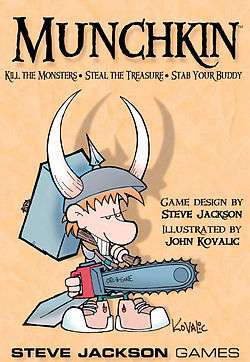Munchkin (card game)
|
Old box cover | |
| Players | 3-6 |
|---|---|
| Age range | 10+ |
| Setup time | 1-2 minutes |
| Playing time | 1-2 hours |
| Random chance | High |
| Skill(s) required | Strategy |
Munchkin is a dedicated deck card game by Steve Jackson Games, written by Steve Jackson and illustrated by John Kovalic, that has a humorous take on role-playing games, based on the concept of munchkins (immature role-players, playing only to "win" by having the most powerful character possible). Munchkin won the 2001 Origins Award for Best Traditional Card Game,[1] and is itself a spin-off from The Munchkin's Guide to Powergaming, a gaming humor book that also won an Origins Award in 2000.[2]
After the success of the original Munchkin game several expansion packs and sequels were published.[3] Now available in 15 different languages, Munchkin accounted for more than 70% of the 2007 sales for Steve Jackson Games.[4]
Gameplay
In Munchkin, all players start at level 1 with the goal of reaching level 10 (or level 20 in Epic Level games). Players primarily progress by killing monsters, and level up every time they kill a monster. However, players can freely use cards against monsters and other players during play, allowing them to either assist or to sabotage others during their turn. Each person's turn begins when they "kick down the door" by drawing a Door Card face-up, which can be: a Monster Card, which the player must engage by fighting or fleeing; a Curse Card, which applies an effect; or an Item Card, Race Card, or Faction Card, which the player adds to their hand. If the door is kicked down but it is not a monster, the player can either "loot the room" by drawing a face-down door card and adding it to their hand, or "look for trouble" by playing a Monster Card from their hand to fight it.
When fighting a monster, the total level of the player (and any supporting players) is weighed against the total level of the monster(s) to determine the victor: a successful player draws the listed amount of treasure cards and levels up either 1 or 2 levels, but an unsuccessful character must roll the dice to try and flee; players who fail to roll a five or six suffer the monster's negative effects ("Bad Stuff") or die. Should a player die, their turn immediately ends and they discard their hand, retaining their player level but drawing a new hand for equipment.
Due to the highly competitive nature of the game and the presence of rule-breaking cards, players are encouraged to use unfair tactics against others, to act mercenary to further themselves at the expense of others, or to use cheat cards to affect outcomes (such as fixing the roll of the die). Throughout a player's turn, others are free to intervene: they can passively buff or debuff the player or monsters to alter the outcome; play monster cards of matching type to make the battle more difficult; or offer to assist the player, typically in exchange for treasure cards.

Other cards that can enter play include Items, which can be used in combat, Treasure Cards, which act as sellable loot and equipment, and Curse Cards, which apply effects. Additionally, players can equip certain cards (such as armor and weapons) to raise their total level and kill stronger monsters, and can use Class Cards and Race Cards to grant extra abilities or advantages at the cost of a balanced weakness; for example, the elf race can level when helping others kill monsters, but will take additional damage from disgusting enemies.
Standard games typically last around an hour, with the game ending once a player reaches the target level and wins the match. Aside from defeating monsters, players can progress though indirect means such as selling cards (with every 1000 Gold on the sum total granting a level) or by playing special leveling cards. Most games disallow victory through indirect methods, meaning only fighting a monster can win the game. There are a few exceptions, however, such as when a player uses cards which specifically state they override rules.
Reception
RPGnet regards Munchkin as not a very serious game;[5] the rules make this clear with phrases like "Decide who goes first by rolling the dice and arguing about the results and the meaning of this sentence and whether the fact that a word seems to be missing any effect," and "Any disputes in the rules should be settled by loud arguments with the owner of the game having the last word." There are many cards which interact with or are affected by a single other card, despite the rarity of the two cards entering play together (such as the interaction between Fowl Fiend and Chicken on Your Head or Sword of Slaying Everything Except Squid and Squidzilla).
References
- ↑ "Origins Award Winners (2001)". Academy of Adventure Gaming Arts & Design. Archived from the original on 2008-02-02. Retrieved 2007-10-15.
- ↑ "Origins Award Winners (2000)". Academy of Adventure Gaming Arts & Design. Archived from the original on 2008-04-15. Retrieved 2007-10-15.
- ↑ "Munchkin home page". Steve Jackson Games. Retrieved 2007-12-23.
- ↑ "2008 Report to the Stakeholders". Steve Jackson Games. Retrieved 2008-03-01.
- ↑ Appelcline, Shannon (January 2002). "Munchkin (Capsule Review)". RPGnet. Retrieved 2007-10-15.
External links
- The World of Munchkin (official website)
- Steve Jackson Games
- Steve Jackson and others playing a game of Munchkin and others at Geek & Sundry.
